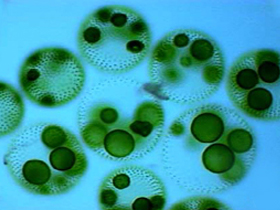Plant and animals are composed of a type of cell known as eukaryotic. Eukaryotic cells' main distinguishing features are that they possess a nucleus, inside which is found the DNA molecule that encodes genetic information. Some single-celled organisms such as bacteria, on the other hand, have no cell nuclei, and their DNA molecules are in a free state inside the cell. (See Bacteria.)
This second cell type is known as prokaryotic-an ideal cell structure for bacteria, because plasmid transfer (the transfer of DNA from cell to cell)- an exceedingly important process from the point of view of bacteria populations-is made possible thanks to DNA being free within the prokaryotic cell.
Since the theory of evolution is obliged to arrange life from the primitive to the complex, it assumes that prokaryotes are primitive cells, and that eukaryotes evolved from them.
Before addressing the invalidity of this claim, it's useful to state that prokaryotic cells are not primitive at all. A bacterium has almost 2,000 genes, and each gene contains up to 1,000 letters of genetic code. This means that the information in a bacterium's DNA is at least 2 million "letters" long. Accordingly, the information contained in the DNA of a single bacterium is equivalent to 20 volumes of 100,000 words each.129
In addition to DNA's sensitive structure that withstands random changes, the lack of any intermediate form between bacteria and eukaryotic cells totally invalidates any claim of evolution. The Turkish evolutionist Professor Ali Demirsoy admits that the scenario of bacteria cells evolving into eukaryotic cells-from which more complex life forms then emerged-is invalid:
One of the most difficult phases to account for in evolution is the scientific explanation of how complex cells with organelles came into being from these primitive organisms. In fact, no transitional form between these two forms has ever been found. Single-celled and multi-celled organisms fully possess this complex structure, and no group or organism with simpler organelles or which is more primitive than either of these has ever been encountered. In other words, the organelles they possess emerged fully developed. There are no simple and primitive forms.130
Bearing in mind the enormous structural differences between the bacterium cell and plant cells, the impossibility of any such transition becomes crystal-clear:
- The bacterium cell wall consists of polysaccharide and protein, whereas the plant cell wall is made of cellulose, which has a completely different structure.
- In a plant cell, there are various organelles with highly complex structures and surrounded by a membrane, but no organelles in the bacterium cell. The bacterium cell contains only very small ribosomes in a free state. In the plant cell, the ribosomes are much larger and connected to the membrane. In addition, each type of ribosome performs protein synthesis in a different way.131
- The structures of the DNA in the plant and bacterium cells are totally different.
- The DNA molecule in plant cells is protected by a double-layered membrane, while the DNA in the bacterium cell is free within it.
- In terms of appearance the bacterium's DNA molecule resembles a closed loop. The DNA molecule in a plant cell is linear.
- The DNA molecule in the bacterium cell contains information regarding only that single cell, while the plant cell's DNA carries information about the entire plant. All the information concerning a fruit tree's roots, trunk, leaves, flowers and fruit exists separately in the DNA in each cell nucleus.
- Some species of bacteria are photosynthetic, performing photosynthesis. In contrast to plants, however, bacteria break down the compounds and do not emit oxygen. Moreover, inside the chloroplasts in photosynthetic bacteria (cyanobacteria, for instance), chlorophyll and pigments do not exist. These are distributed throughout the cell, concealed in various membranes.
- The messenger RNAs in the bacterium and in the larger plant and animal cells are very different from one another in terms of biochemical structure.132
Messenger RNA performs a function that is vital to the cell's survival. However, although messenger RNA plays the same essential role in both eukaryotic and prokaryotic cells, it has a different biochemical structure in each. Darnell writes on this subject in an article in Science magazine:
The differences in the biochemistry of messenger RNA formation in eukaryotes compared to prokaryotes are so profound as to suggest that sequential prokaryotic to eukaryotic cell evolution seems unlikely.133
The enormous structural differences between bacteria and plant cells, of which we have listed a few examples, represent a major impasse for evolutionist biologists. Some bacteria and plant cells do have some features in common, but these structures are generally very different from one another. These differences, and the impossibility of any functional intermediate form, make it impossible for the plant cell to have evolved from a bacterium.
Professor Demirsoy actually admits this: "Complex cells never developed from primitive cells by a process of evolution." 134129. Mahlon B. Hoagland, Hayatın Kökleri, Tübitak Publishing, 8th edition, p. 25.
130. Prof.Dr. Ali Demirsoy, Kalıtım ve Evrim, Ankara: Meteksan Publishing, p. 79.
131. Prof. Dr. İlhami Kiziroğlu, Genel Biyoloji, (General Biology) Istanbul:.Desen Publications.
132. Robert A. Wallace, Gerald P. Sanders, Robert J. Ferl, Biology, The Science of Life, Harper Collins College Publishers, p. 283.
133. Darnell, "Implications of RNA-RNA Splicing in Evolution of Eukaryotic Cells," Science, Vol. 202, 1978, p. 1257.
134. Prof. Dr. Ali Demirsoy, Kalıtım ve Evrim, p. 79.


